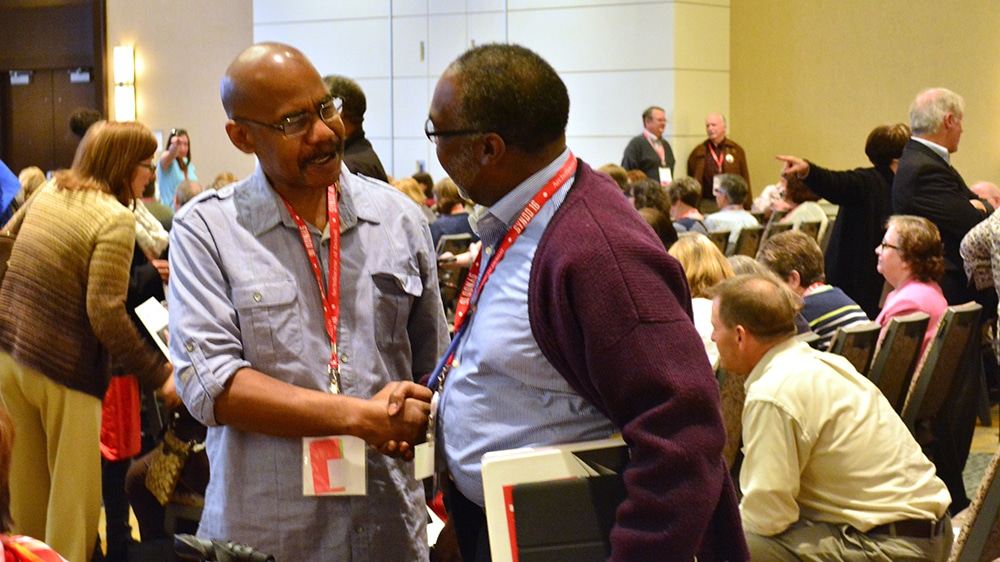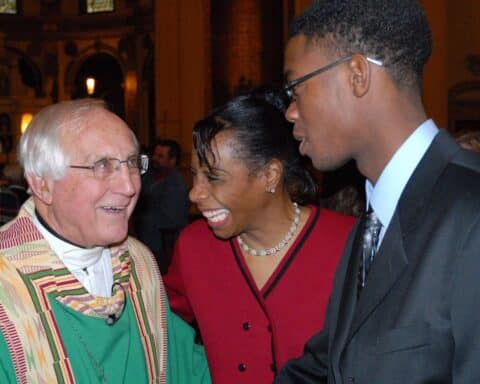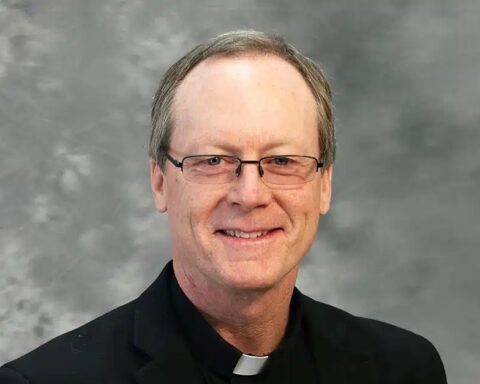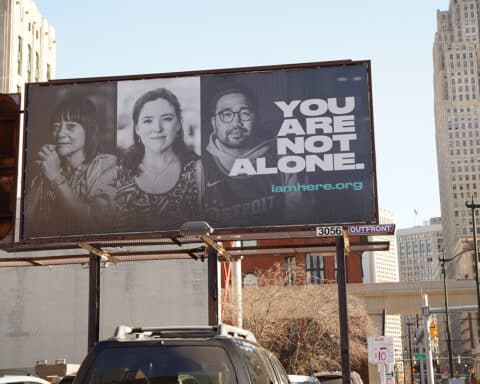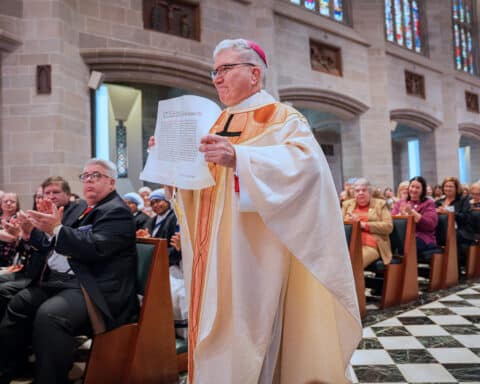With the priests and lay faithful in the Archdiocese of Detroit increasingly embracing a new missionary spirit of intense discipleship, the Catholic Church appears to be on the move again in the Motor City.
“There is a burgeoning hope in the Archdiocese of Detroit that this is bigger than us, that this is God’s work, and it’s his plan,” Auxiliary Bishop Gerard William Battersby said in referring to Unleash The Gospel, a local initiative of renewal and reevangelization.
Through a yearslong path of prayer and discernment that included a special year of prayer for a new Pentecost in Detroit and an archdiocesan-wide synod in 2016, Bishop Battersby told Our Sunday Visitor that he believes the Holy Spirit is revealing that God “has staked his claim” on not only renewing the Church in Southeastern Michigan, but also in the United States and across the world.
“Unleash The Gospel is not a numbers game,” Bishop Battersby said. “It’s about falling in love with the one who loves us, and that’s a person-by-person change.”
Unleash The Gospel made recent national headlines when Archbishop Allen Vigneron of Detroit announced in mid-May that the archdiocese would be ceasing youth sporting events on Sundays to reclaim the Sabbath as a day of prayer and rest.
“One of the clearest calls from Synod 16 was for our Church to reclaim Sunday as a day set apart for the Lord, for family and for works of mercy,” the archbishop wrote in a pastoral note that explained the reasoning for halting Sunday CYO and Catholic high school sports games and practices.
Archbishop Vigneron also wrote that the archdiocese was “in the midst of a missionary conversion, a change in our culture” that is prompting a wide reexamination of the way Catholics in Southeast Michigan live collectively as a community of faith.
Edmundo Reyes, the communications director for the Archdiocese of Detroit, told OSV that Unleash The Gospel — which he called “a movement” — is “about going back to the core mission of the Church, which is to evangelize, which is why the Church exists.”
“It’s a movement to mission,” Reyes said. “We call it going from maintenance to mission. It’s about sharing the Gospel with people. It’s about telling the story of Jesus to people in a way that’s relevant to them, to invite them to encounter God, to become disciples and grow as disciples, and to witness to the Faith.”
Shifting paradigm
The paradigmatic shift from maintaining the Catholic institutional footprint in Detroit, most of which was established over a century ago, to cultivating a more intentional — some would even say evangelical — form of practicing the Catholic faith in one sense reflects the demographic reality facing the Church in the Midwest.
For the last 50 years, Catholics have been leaving the region’s Rust Belt areas for new economic opportunities in the South and West. From 2000 to 2018, membership in Michigan’s Catholic parishes declined from 2.2 million to 1.8 million, according to the Center for Applied Research in the Apostolate at Georgetown University.
“The Church is facing strong cultural headwinds,” said Mark Gray, the director of CARA Catholic Polls and a senior research associate at CARA, who told OSV that Archbishop Vigneron’s recent statement on setting aside Sunday for prayer and rest “might be an important statement and reminder.”
Other dioceses across the Midwest and the Northeast, which are facing similar demographic challenges, also in recent years have launched renewal initiatives that chancery officials have described as efforts to reinvigorate the local Church, even as critics have sometimes dismissed those efforts as “managing the decline.”
“In Detroit, this is a sort of back-to-basics approach,” said J. Patrick Hornbeck II, the theology department chairman at Fordham University who has studied the Catholic Church in the United States. Hornbeck told OSV that much of the Unleash The Gospel initiative seems to be “very much in line” with what many people say they like about Pope Francis’ style of leadership.
“One of the things most attractive to many people about Pope Francis is that he seems to put the Gospel at the center of everything he does,” Hornbeck said. “He seems to live out those Gospel values without much in the way of extravagance or highfalutin language.”
Pope Francis’ emphasis on synodality — having open and honest discussions, and listening to and seeking input from the lay faithful — has been a key feature of Unleash The Gospel. In the months leading up to the 2016 archdiocesan synod, local Church officials met with thousands of Catholics in 240 meetings, gathering more than 11,000 unique points of feedback that were synthesized into the themes, discussions and proposals that took place during the synod.
“I was struck by how much of the synod was led by questions surrounding the family,” Bishop Battersby said. “Mothers and fathers shared just how concerned they were about all the negative influences impinging on their kids.”
Roadmap for transformation
The archdiocesan synod, which was held over three days of prayer and discussion in November 2016, paved the way for Archbishop Vigneron’s Unleash The Gospel pastoral letter in 2017, which reflected on the synod. From that letter, Unleash The Gospel was born as a movement.
“It provided a roadmap for the missionary transformation of our diocese,” Reyes said.
Over the last couple of years, the archdiocese established the Unleash The Gospel Council, a permanent body that assists the archbishop in assessing the local Church’s ongoing response and implementation of the 2016 synod. Bishop Battersby heads that council.
“Right now, the Holy Spirit is highlighting for us in Detroit a missionary impulse,” Bishop Battersbys said.
Taking its cues from the 2016 synod, the archdiocese launched an Unleash The Gospel magazine and rolled out Detroit Catholic, a digital news service and website with daily email, video, audio and social media components. The service succeeded the archdiocese’s newspaper.
In addition, Archbishop Vigneron has committed to writing a series of pastoral notes that expand upon the insights from the synod and his pastoral letter. The pastoral notes have touched on themes pertaining to the local Church’s need to confront racism, the 50th anniversary of Humanae Vitae (“Of Human Life”) and the importance of Christian burial.
There have been moments of grace along the way to renewal, including a Mass for Pardon that Archbishop Vigneron celebrated in 2016, as well as the November 2017 beatification Mass for Father Solanus Casey, a Capuchin priest, at Ford Field.
“This is not a priest-led movement,” Bishop Battersby said.
The next step in Unleashing the Gospel in Detroit centers on renewing and transforming parish life. Each parish in the archdiocese is now being asked to create a plan to realign all of its activity and ministries to become the kind of missionary parish envisioned during the synod.
“The whole game has changed. The whole paradigm has shifted,” Reyes said. “This is now about how do we reach out and serve everyone who needs the Lord Jesus in Southeast Michigan.”
Brian Fraga is a contributing editor for Our Sunday Visitor.
| Demographic challenges in Michigan |
|---|
|
The news website Michigan Live, mlive.com, recently posted some statistics about Michigan’s Catholic community. The news report said, “Between 2000 and 2018, membership in Michigan’s Catholic parishes dropped from 2.2 million to 1.8 million, according to Georgetown University’s Center for Applied Research in the Apostolate (CARA), which collects annual data from U.S. Catholic dioceses.” CARA also wrote about declines in Catholic sacraments and education: “Infant baptisms, down 49% since 2000. Weddings blessed by the Catholic Church, down 54%. First Communions, down 46%. Enrollment in Catholic grade schools, down 49%. Enrollment in K-12 religious education classes, down 48%.” The news item noted, “The number of sacraments in the 2000 and 2018 CARA reports reflect the totals for the previous 12 months. The number of weddings include all marriages blessed by the Church, regardless of whether it was performed in a Catholic church. One number not included in this chart are the number of adults baptized in another Christian faith who converted to Catholicism. That number was 3,793 in 2000 and 2,322 in 2018, a 39% drop.” |

